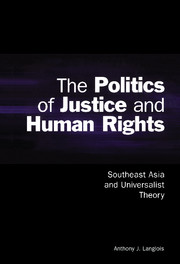Book contents
5 - The Return of Politics and Human Rights
Published online by Cambridge University Press: 05 July 2014
Summary
The concern of the previous chapter was with the relationship between the human rights discourse and those understandings held across the human traditions about what constitutes just and emancipatory behaviour towards other people. The discussion revolved around the way in which the human rights discourse names behaviours commonly considered to be just and emancipatory, despite the radically different and even incommensurable reasons given for the rightness of these behaviours within the different human traditions.
Here the argument is taken a step further: to discuss the implications of diversity and intractable disagreement about what is meant by justice and emancipation. In doing so, the discussion does not attempt to define or ground the content of these concepts in a manner that will gain universal acceptance. This was the mistake of the Enlightenment and liberal projects. The discussion here proceeds on the assumption that the human rights discourse is about justice and emancipation, and that, while these terms may be defined diversely and even incommensurably between the human traditions, they are not arbitrary. In this way, the human rights discourse is recognised as an arena for the discussion, debate and institutionalisation of our various and sometimes antithetical conceptions of justice and emancipation. There is a need for an account of how this arena works and should properly be understood to work — a political account of the human rights discourse.
- Type
- Chapter
- Information
- The Politics of Justice and Human RightsSoutheast Asia and Universalist Theory, pp. 125 - 158Publisher: Cambridge University PressPrint publication year: 2001



